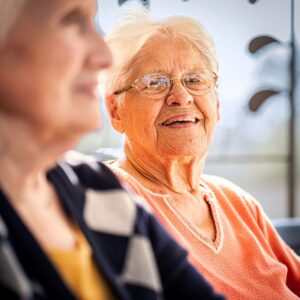Friendships and the Art of Aging Well
 Friendships are crucial in our well-being throughout life, becoming even more significant as we age. More than one-third of adults aged 45 and older feel lonely, and nearly one-fourth of adults aged 65 and older are considered to be socially isolated, according to The National Academies of Sciences, Engineering, and Medicine (NASEM).
Friendships are crucial in our well-being throughout life, becoming even more significant as we age. More than one-third of adults aged 45 and older feel lonely, and nearly one-fourth of adults aged 65 and older are considered to be socially isolated, according to The National Academies of Sciences, Engineering, and Medicine (NASEM).
Indeed, older adults are more likely to face factors such as living alone, the loss of family or friends, chronic illness, and hearing loss. Because of these factors, those seniors are at increased risk for loneliness and social isolation.
Why are friendships important?
Body, mind, and soul
We gain a sense of belonging from our friendships, which can help senior adults to combat depression and loneliness. Many older adults are at risk because of experiences like retirement, loss of loved ones, or loss of mobility.
 Keeping an active mind is important, especially as we age, as it may prevent cognitive decline. Social interactions and activities can also help keep the mind active, promoting mental acuity.
Keeping an active mind is important, especially as we age, as it may prevent cognitive decline. Social interactions and activities can also help keep the mind active, promoting mental acuity.
Older adults with active social lives tend to have better immune function as well as a lower risk of health problems like hypertension and heart conditions.
The emotional support from friends can be a buffer against stress and can lead to a longer, healthier life.
Older adults with meaningful relationships and social support are likely to live longer than their peers with fewer connections. Friends can provide emotional support, vital for managing life’s challenges – illness, loss, changes in living situations, and other changes.
Motivation! Friends can motivate and support each other in many ways, including healthy habits, staying active, eating well, and scheduling regular health check-ups. Older adults can gain a sense of purpose and reason to stay active when engaged with their social groups and friends.
What about my pet?
 While human friendships offer unique emotional and social support, the companionship of pets also provides a range of advantages. They can offer constant companionship, helping to reduce loneliness and isolation, especially for those who live in isolated or rural environments. Caring for your dog, for example, encourages physical activity through your daily routines like walking. This activity is beneficial for cardiovascular health and overall fitness.
While human friendships offer unique emotional and social support, the companionship of pets also provides a range of advantages. They can offer constant companionship, helping to reduce loneliness and isolation, especially for those who live in isolated or rural environments. Caring for your dog, for example, encourages physical activity through your daily routines like walking. This activity is beneficial for cardiovascular health and overall fitness.
Spending time with pets can lower stress levels and reduce blood pressure encouraging relaxation. Caring for an animal can give anyone a sense of purpose and responsibility, and, for older adults, this can be notably fulfilling. Like our human friends, pets can act as social sparks, encouraging interactions with others – with neighbors or people at the local park, for example. Our animals provide unconditional love and affection, comforting and satisfying us emotionally.
So, while the social connections with animals are different from those with humans, they can still play a significant role in promoting the well-being of older adults, particularly those in more isolated settings.
How can I strengthen my social ties?
There is no age limit on friendships but they do require some effort. If you’ve felt alone for a while, it might feel uncomfortable, but there are many ways to strengthen your social ties.
Volunteer – It can be anything that interests you – a political campaign, beach or park clean-up, helping with animals at a shelter, and so on.

Join a club – There are many clubs available in most cities. Consider a book club if you’re a reader. Or find a quilting, knitting, or crochet circle, a dining out club to experience new people and food.
Visit a senior center – This is met with resistance sometimes, but please check out your local senior center. It may be rich with resources (see above) and offer day trips, movie viewings, art projects, and other activities. You might even find a few friendships!
Join the local YMCA and swim, or grab your clubs and hit the local golf course. You’ll meet other enthusiasts there and stay fit and healthy while you do it.
Tutor – Consider volunteering at a school or youth center to tutor students.
In essence, friendships enrich our lives with joy, support, and a sense of community, which are fundamental to aging well. They help maintain a positive outlook on life and provide a network of care that is especially important as one navigates the later years of life.
Read other articles in this series, The Art of Aging Well.
Learn how PPMA can help you achieve your best healthy self yet!

